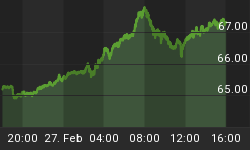"Everything should be made as simple as possible..." - Albert Einstein
You don't need a degree in macro economics to understand an economy. Just because an economy is complex, the analysis need not be. I've been studying the change in GDP from Q4 2010 to Q1 2011 to get a sense of where the economy is regarding contraction or expansion. I have a sense the economy stands today where it stood in December 2007 the very month the great recession began.
I've shared various technical charts showing striking similarities with the 10 year treasury market and equity markets comparing the price action between May 2011 to present and October 2007 through December. The big component though was the macro picture. You could easily argue it is far closer to recession now than it was in 2007 when Q4 07 GDP was 2.9% only to print (.72)% the very next quarter. With Q1 2011 GDP at 1.9% the margin for error is far less than in 07. But that is not enough to base an investment decision upon.
2007: Imagine in December 2007 asking the question if Q1 2008 would contract. It would be hard to say yes as a 2.9% print is pretty solid. That is until the consumer rolled over.

2011: Few if any economists are calling for recession in 2011 but why? One can argue making that call today is far easier than December 2007. Look at the fall off in consumer from Q4 to Q1. Many would argue it did fall but still well above contraction. Additionally the investment component showed a strong resurgence in Q1.

So is the US economy vulnerable to recession as early as Q2 of this year? July's drop in the University Of Michigan Sentiment would say yes.
In comparing University Of Michigan Sentiment readings with various components of GDP I was amazed at how well it tracks both the Total Consumer component (goods and services) and the Fixed Investment component.
Consumer: The charts would say the consumer is ready to contract, possibly as low as (1.0)%

Fixed Investment: The charts would say the Fixed Investment component also is set for some serious contraction.

The remaining components Net Foreign Trade and Inventory seem to offset one another over time as shown below (they oscillate for the most part between plus or minus 1%). What has been trending lower though is the Government portion. The question then becomes when the next recession comes just how able is the government to stimulus spend. We know they will try but at what point will the bond market even in the face of Fed printing limit their ability?

Apparently the US economy never watched the movie Field Of Dreams. For they have in fact built it but based on consumer sentiment, they have also failed to come.















